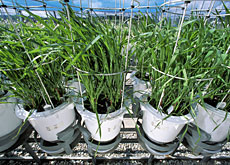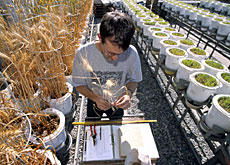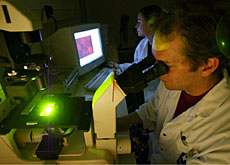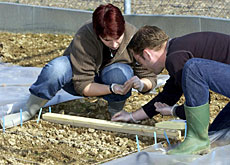Scientists plan new GM crop trials

Three years after a series of controversial field experiments with genetically modified (GM) wheat, Swiss scientists are planning similar crop trials.
Two teams of university researchers have applied to carry out tests near Zurich and Lausanne, including observations of potential crossbreeding between wheat and wild grass.
The proposed field trials by Zurich University’s Institute of Plant Biology and the Institute of Plant Sciences at the city’s Federal Institute of Technology would form part of a planned national research programme.
The aim would be to help answer questions about the release of transgenic plants, specifically in Switzerland.
“It is important to clearly say that we are not developing a product for the market,” Beat Keller, a lead researcher on the project, told swissinfo.
“We want to find out if GM wheat plants that we have already tested in the labs, which show improved resistance to fungal diseases, also [behave in a similar way] in the field in normal agricultural environments.”
They also intend to look at aspects of biological safety to see if the plants have any unexpected impact on the environment, as well as organisms living in the ground or insects.
If the Federal Environment Office gives the go-ahead, trials will run over a two-year period from 2008 in Reckenholz near Zurich, and in Pully, on the outskirts of Lausanne. The office is expected to reach its decision within the next three months.
Controversial
Genetically modified organisms (GMOs) remain a highly contentious issue in Switzerland. In November 2005 the Swiss voted in favour of a five-year ban on the use of GMOs in agriculture. Scientific research, however, is still permitted.
During discussions before the vote all political parties said it was necessary and essential to increase research into this topic and use the five-year moratorium period to clarify questions.
But the last GM crop trials in Switzerland, which took place in Lindau near Zurich in 2004, resulted in major opposition and a lengthy legal battle.
Keller is certain that there will be resistance to the project, but hopes that there will be better public acceptance than three years ago.
“There is a clear need and demand from society to clarify questions,” he reckons.
“And the project also includes a very broad consortium of research groups which will approach it from many different angles.”
Scepticism
GM opponents were quick to react to Tuesday’s announcement.
“We are very concerned. We don’t want trials that are a Trojan horse,” said Herbert Karch, a committee member of the Swiss Working Group for Genetic Engineering (SAG).
While trials are allowed in principle, SAG is doubtful whether the proposals meet strict criteria set out in the law on genetic engineering.
It also questions the use of wheat in the trials. “There is no need for these kind of plants,” said Karch.
No country currently grows GM wheat and producers refuse to do so, SAG said in a statement on Tuesday.
“We are doing fundamental research and it’s a fact that for clarifying questions about the use of transgenic plants in Switzerland, wheat is probably the best crop as it is among the most-grown. It’s an obvious choice,” replied Keller, trying to placate opponents’ fears.
Environmental organisation Greenpeace, which opposed the 2004 trial both in the courts and with a demonstration at the site, also expressed its surprise about the news and warned about what it considers to be the dangers of GMOs for the environment, and for the health of both humans and animals.
Yves Zenger, spokesman for Greenpeace, said the majority of Swiss people, like others in many parts of the world, were against the release of GMOs.
The organic farming association Bio Suisse, while supporting GM research in a closed environment, said it was extremely wary of field trials of modified organisms.
Before approving the tests, it said the authorities should carry out a complete and detailed risk analysis.
swissinfo with agencies
As of April 2007, at least 174 regions, over 4,500 municipalities and other local entities and tens of thousands of farmers and food producers in Europe have declared themselves “GMO-free”.
Across Europe, 70% of consumers have rejected GM foods, according to Friends of the Earth.
Three official GM field experiments have been carried out in Switzerland. In 1991 and 1992 GM potatoes were planted at Changins in canton Vaud and in 2004 research into GM wheat was carried out by the Federal Institute of Technology in Zurich between March 18 and July 14, 2004.
In November 2005 Swiss voters accepted a proposal for a five-year blanket ban on genetically modified organisms (GMOs) in Swiss agriculture.
The result forced the Swiss government to put in place some of the toughest legislation on GMOs in Europe.
The European Union, of which Switzerland is not a member, ended a six-year moratorium on accepting applications for new genetically modified foods in May 2004.
But Germany and France, two of Switzerland’s neighbours, have both voted to uphold national bans on products they deem unsafe.
Spain is the only EU country that has been growing GMOs (GM maize) in any significant quantities. Otherwise, the EU remains largely GMO-free.

In compliance with the JTI standards
More: SWI swissinfo.ch certified by the Journalism Trust Initiative



You can find an overview of ongoing debates with our journalists here . Please join us!
If you want to start a conversation about a topic raised in this article or want to report factual errors, email us at english@swissinfo.ch.